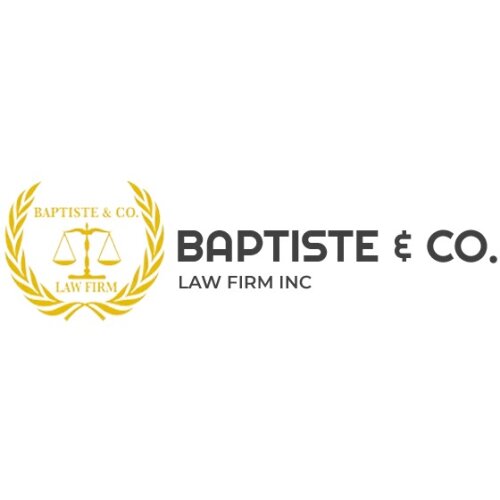Best Oil, Gas & Energy Lawyers in Saint Vincent and the Grenadines
Share your needs with us, get contacted by law firms.
Free. Takes 2 min.
Or refine your search by selecting a city:
List of the best lawyers in Saint Vincent and the Grenadines
About Oil, Gas & Energy Law in Saint Vincent and the Grenadines:
Saint Vincent and the Grenadines is a small island nation in the Caribbean with significant potential for oil, gas, and renewable energy resources. The legal framework governing the oil, gas, and energy sector in the country is crucial to ensure sustainable development and proper regulation of natural resources.
Why You May Need a Lawyer:
People involved in the oil, gas, and energy industry in Saint Vincent and the Grenadines may require legal assistance for various reasons such as drafting contracts, resolving disputes, navigating regulatory requirements, negotiating with government authorities, and ensuring compliance with environmental laws.
Local Laws Overview:
The key aspects of local laws concerning oil, gas, and energy in Saint Vincent and the Grenadines include regulations related to exploration, production, and distribution of resources, environmental protection, land use rights, taxation, and licensing requirements. It is essential to understand and comply with these laws to avoid legal issues.
Frequently Asked Questions:
Q: What are the main sources of energy in Saint Vincent and the Grenadines?
A: The main sources of energy in the country include hydroelectric power, geothermal energy, and solar power. The government is also exploring the potential for oil and gas resources.
Q: How are oil and gas resources regulated in Saint Vincent and the Grenadines?
A: Oil and gas resources are regulated by the Energy Unit under the Ministry of Energy. The government has established laws and regulations to govern the exploration, production, and distribution of these resources.
Q: What are the environmental considerations for the oil and gas industry in Saint Vincent and the Grenadines?
A: The government has implemented environmental regulations to protect the environment and ensure sustainable practices in the oil and gas industry. Companies operating in this sector must comply with these regulations to minimize their impact on the environment.
Q: How can a lawyer help with negotiating energy contracts in Saint Vincent and the Grenadines?
A: Lawyers can provide legal advice on drafting and negotiating energy contracts, ensuring that the terms are favorable and compliant with local laws. They can also assist in resolving disputes that may arise during the contract's implementation.
Q: What are the tax implications for companies operating in the oil and gas sector in Saint Vincent and the Grenadines?
A: Companies operating in the oil and gas sector are subject to taxation based on their activities and profits. It is important to seek legal advice to understand the tax implications and ensure compliance with the relevant laws.
Q: How can a lawyer assist with obtaining licenses for energy projects in Saint Vincent and the Grenadines?
A: Lawyers can help navigate the licensing requirements for energy projects, ensuring that all necessary permits and approvals are obtained from government authorities. They can also provide guidance on compliance with regulatory requirements.
Additional Resources:
For more information on oil, gas, and energy laws in Saint Vincent and the Grenadines, you can contact the Energy Unit under the Ministry of Energy or consult with legal professionals specializing in this field.
Next Steps:
If you require legal assistance in the oil, gas, and energy sector in Saint Vincent and the Grenadines, it is recommended to seek guidance from experienced lawyers who understand the local laws and regulations governing this industry. They can provide valuable advice and representation to protect your interests and ensure compliance with the relevant legal requirements.
Lawzana helps you find the best lawyers and law firms in Saint Vincent and the Grenadines through a curated and pre-screened list of qualified legal professionals. Our platform offers rankings and detailed profiles of attorneys and law firms, allowing you to compare based on practice areas, including Oil, Gas & Energy, experience, and client feedback.
Each profile includes a description of the firm's areas of practice, client reviews, team members and partners, year of establishment, spoken languages, office locations, contact information, social media presence, and any published articles or resources. Most firms on our platform speak English and are experienced in both local and international legal matters.
Get a quote from top-rated law firms in Saint Vincent and the Grenadines — quickly, securely, and without unnecessary hassle.
Disclaimer:
The information provided on this page is for general informational purposes only and does not constitute legal advice. While we strive to ensure the accuracy and relevance of the content, legal information may change over time, and interpretations of the law can vary. You should always consult with a qualified legal professional for advice specific to your situation.
We disclaim all liability for actions taken or not taken based on the content of this page. If you believe any information is incorrect or outdated, please contact us, and we will review and update it where appropriate.
Browse oil, gas & energy law firms by city in Saint Vincent and the Grenadines
Refine your search by selecting a city.











